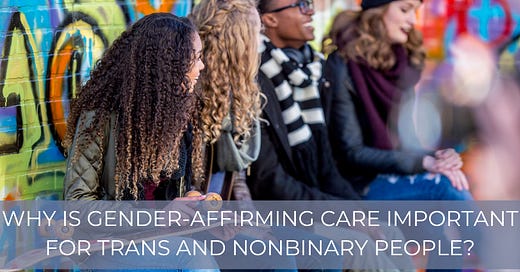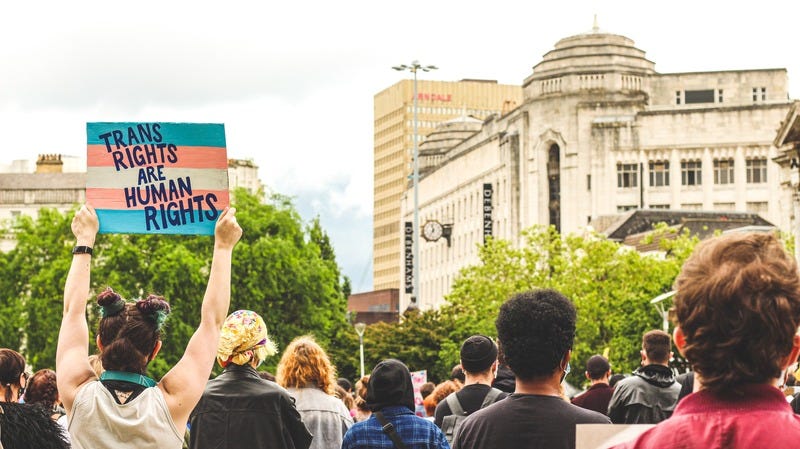Trans people have a right to healthcare. One of the most egregious pieces of anti-trans legislation in the US to date just passed in Kentucky. It targets gender-affirming health care for trans youth, insurance, doctors who provide gender-affirming care, legal name changes for youth, and more. If you want to read more about anti-trans legislation, I highly recommend Erin Reed's journalism (a free or paid subscription to Erin in the Morning on Substack). I was so angry when I read about this bill. The majority of legislators in Kentucky are preventing youth from accessing potentially life-saving health care. So why is gender-affirming care important for trans and nonbinary people?
Trans people who receive medical treatment—such as gender affirming hormone therapy (also known as hormone replacement therapy) or hair removal—tend to be healthier, happier, and less suicidal, with very low rates of regret following treatment. Medical transition is not for everyone, but for people who choose gender-affirming procedures and medications, it very effectively increases quality of life.
This post digs into why is gender affirming care important.
What is gender-affirming care?
Gender-affirming medical care can include:
Gender-affirming hormone therapy, also known as hormone replacement therapy or HRT
Puberty blockers
Hair removal (laser or electrolysis)
Surgery (for adults only, not kids or teens)
Appropriate medical care can be life-changing and life-saving for people experiencing gender dysphoria from their body or hormones not being right for them. Anecdotally, many trans people struggle over the decision to start hormone therapy for a long time, and may start on a low dose. Some people choose to discontinue hormone therapy after trying it if it's not right for them, a valid and reasonable decision. Some people find huge relief and joy in the way their body and mood change after starting hormone therapy.
Gender-affirming care for both cis and trans people
I drove past a "Hormone Replacement Clinic" yesterday in Florida. This medical facility provides hormone therapy primarily to post-menopausal cis women. It made me remember that most gender-affirming care was developed to help cis people (and is still accessible for cis people). Men with low testosterone can be treated for their medical condition (and it's easier for cis men than trans men to access this care). Cis people have masectomies, breast reductions, breast implants, and no one is passing legislation to prevent this.
Cis people have gender-affirming procedures and take hormones frequently. Trans people should have access to the same standard of medical care as cis people. Anything else is discrimination.
Puberty blockers are another treatment developed for cis kids who start puberty too early. To remove trans kids' access to these medications is incredibly harmful for kids who don't want to unnecessarily go through the wrong puberty. Puberty blockers merely delay the effects of puberty, giving trans kids more time to be sure what is right for them (and reach an age where they can potentially start gender-affirming hormone therapy).
Let's support and protect trans kids
Some parents have the instinct to protect their kids by trying to prevent them from being trans. This may be because the world is more challenging, painful, and dangerous for trans people. That's true, but, I believe it's better for parents to not be part of the problem. Being trans or being a particular gender is so integral to most people that when a guardian tries to prevent visible signs of being trans, it feels cruel, hurtful, and untenable.
We can't make boys be girls if they are actually boys. We can't make girls be boys if they are actually girls. Anything you do from the outside to try to change someone's gender identity is bullying and can be abuse.
Trans kids can grow up to be healthy, successful adults, many with great families and jobs. (That's what parents care about, right?) Family support can be so important as any kid is growing up, but especially for trans kids who may receive less support from elsewhere.
The number one thing you can do to support the trans kid in your life is to use correct and respectful language to refer to them. This can include using their new name (if applicable), correct pronouns, and non-gendered or correctly gendered language such as "child," "kid," "son," "daughter," etc. The number two thing you can do is to vote for politicians who support trans rights.
Stay safe and supported
This is a crushing time for trans people who are just trying to live our lives with access to medical care. The best thing we can do is to stay safe and keep on going. We will find, and build, safe communities for ourselves to express our identities. It's infuriat






